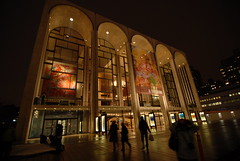In my master’s patriotic music seminar we discussed a portion of a book by Alun Munslow titled “Deconstructionist History.” He supposes that all history is historical narrative. There are no true facts and history is a type of story telling impacted by our own personal bias. He believes that because of this personal bias it is impossible for the actual happenings/facts of an event to be related to another afterwards. The facts are never truly facts and the claimed truth is never supposedly truth.
I was shocked that so much of the class could agree with his theories about history. I understand that no matter what one says it will always be presented with a personal bias of some sort (intentional or unconscious) and therefore historical accounts can be affected by bias. This is what makes historical study or musicology a creative act instead of a regurgitative fact spewing one. History comes alive when you think of the various motives or ‘whys’ of a matter. Or one can consider an aspect of history from the perspective of another culture or nationality. However, so much of class was fearful of facts in and of themselves. Simple claims like Francis Scott Key (the author of the poem “The Star Spangled Banner,” which is the U.S. national anthem) died in 1843 could not be trusted.
My question for Mr. Munslow is does he believe that there is a Truth? When I say Truth I mean to say that there is an actual historical past event that occurred and has defining factual characteristics. If no Truth of any sort exists then everything (our senses, our idea of time etc) is a result of some sort of biological illusion created by evolutionary processes.
However, for the sake of my musing, lets say that Truth does exist (which is what I believe). The question now becomes how well can human beings perceive Truth? How well do we relate that Truth to others? If one says that Truth does exist but we are incapable of relating the Truth of a past moment to others in any factual Truthful way then we have to conclude that we are too flawed to come to any conclusions about anything. Even science falls under harsh scrutiny (like “does gravity exist?”). If we cannot relate Truth to each other (and Truth is so tainted by our own bias that it is unrecognizable) then what is the point of going to college to learn? This means no one can truly relate Honest facts to another. Therefore teachers have nothing to say and people can simply draw their own conclusions. These personal conclusions now become this person’s Truth and all is subjective. Most of the people in my class (masters and doctoral level students) agreed with idea, all is subjective, and therefore history, even basic facts can not be trusted to contain real Truth.
I would challenge my classmates to actually live by this idea; all is subjective and basic facts are useless. They say with their mouths that they believe this but in reality they don’t live by them. The worldview that they express with their actions says otherwise, that there are facts, that there is Truth. No one in my class would take up a Bach piece and decide one of the following:
“Oh, there are too many notes, I’ll just sing these, and omit the other ones over there.”
“I don’t like to sing in this style, I’m going to turn this Bach piece into a romanticized Brahms style song.”
“I don’t like the B-flat so I am going to change it a D!”
No one would do that, it sounds crazy! Still, saying that you can’t trust a simple fact is the same as saying you can’t trust the score in front of you to tell you the composer’s most basic intentions for his piece. A musical work notated on a score is not the same as the music itself. A musical score is a piece of historical writing in a sense that the composer gives to you, supplying you with (hopefully) some Truth about the work, and some is up for interpretation. But, if facts that the composer gives you can’t be trusted one could argue that you could play any note you wanted/any dynamic you wanted/etc because you decided that Bach didn’t mean what he wrote. Or you decided that Bach’s work was tampered with as it was passed down through history. Or what is written simply doesn’t match with your vision of the work so you change it as you see fit.
No music student I know would get up to play a Debussy piece like Mahler because they felt like that is their interpretation of the historical narrative/context of the piece. We would have some very strange and eccentric music students at our school if they really lived by what they purport to believe.
If we as a society are so confused about the idea of Truth and a simple historical fact how can anyone be expected to have any backbone and stand up for what they believe in? If we don’t believe in anything beyond our personal interpretation then how can we make a stand on issues that matter?
In reality there is one Truth. A human being does have the capacity to understand Truth to its fullest extent when it is presented to them. A human being does not always relate Truth to another person in an accurate manner historically speaking. Not because they lie (hopefully) but because of unconscious or conscious bias that changes the emphasis of the story. However, just because the story is distorted slightly through the narrative, the historical evidence of fact remains largely intact with Truthful content. Even if the story is passed on many times (as in a game of telephone) one can go back to original sources or primary sources to compare reports. If there are seeds of truth to that particular historical narrative then those will show up in the other accounts, no matter how others interpret the story surrounding the facts. Fox news is always going to present their bias, so is NBC, and so on, but if you compare accounts you will see that key facts of Truth remain. History is clearly not all subjective, nor is it all objective, but Truth is always objective.
It is possible to know a fact objectively, there is Truth, and I hope you all are out there finding it everyday! 🙂


